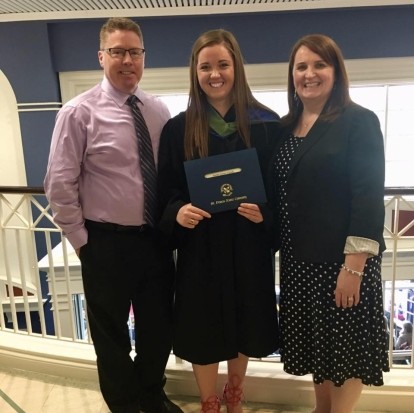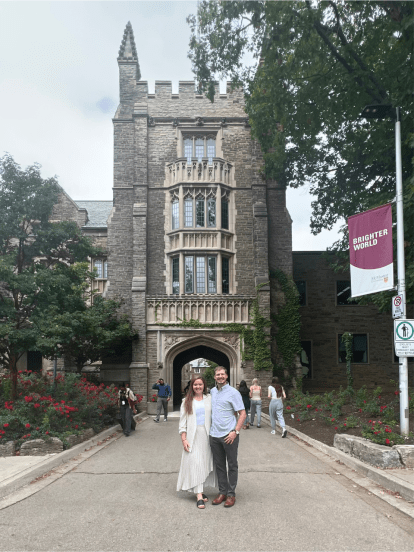
The path that led Dr. Heather O’Grady ‘17 to her current role leading community-based health research in Ontario’s Niagara Region was one she never could have predicted.

Born in Burlington, ON, Heather followed in the footsteps of her parents (both of whom are StFX B.Ed. graduates) and moved to the east coast in 2013 to pursue her undergraduate studies at St. Francis Xavier University. As a human kinetics student, she says she was inspired by professors like Dr. Sasho MacKenzie and Dr. Megan MacGillivray and nurtured by the university’s small class sizes and sense of community.
She considered various career paths, from medical school to physiotherapy, before zeroing in on research.
“I definitely didn’t expect to be where I am,” says Heather, who is now a postdoctoral fellow at the Niagara Health Knowledge Institute, working with Dr. Jennifer Tsang. But when exploring graduate school options, she knew she wanted to continue learning in an intimate environment. "I wanted a smaller program where I had the opportunity to get to know the professors and the instructors and get to know my peers,” she says.
Heather’s interest in the field of rehabilitation science was piqued at McMaster University where she met and was mentored in her master’s work by Dr. Michelle Kho, an intensive care unit physiotherapist and associate professor.
Another significant interest to emerge during her graduate studies was the field of knowledge translation, which bridges the gap between research and practice. This fascination led her to transition into a PhD program, where she would expand her research to incorporate this new theme.
Then everything changed. Early in Heather's doctoral studies, the COVID-19 pandemic swept the world and forced her, and so many others, into isolation.
Her original research plans, which included a primary study with physiotherapists working in the ICU, “completely went out the window.” She pivoted to a focus on improving communication with ICU patients and families around research trial participation.
This new project – which included developing and pilot testing an infographic – proved a fruitful opportunity to discover a niche in collaborative, community-based health research.

As a postdoctoral fellow, Heather continues her doctoral work while working to foster community engagement with research. She continues to pursue her passion for knowledge translation, demonstrating "the power of having a team that includes patients and families at the table.”
A recent highlight was having a paper accepted for publication that included patients and family members as co-authors.
Another key achievement was leading a systematic review of in-bed cycling for ICU patients, resulting in a publication that was accepted in NEJM Evidence, the sister journal to the New England Journal of Medicine. She was invited to present the results of this research at the European Society of Intensive Care Medicine World Congress in Barcelona, Spain in 2024.
Looking ahead, Heather aims to continue her work of breaking down barriers between research and practice. “Research doesn’t need to always occur solely at these big academic institutions,” she says, emphasizing the value of having researchers embedded in local communities and hospitals.
To current students, she offers the advice to try new things, get involved, and follow your passion. She also stresses the importance of surrounding yourself with “a really good support system” of people who are invested in your success.
As Heather’s own success story unfolds, she reflects on her formative years at StFX, in particular, the learning environment where she gained confidence to speak up and share ideas, and the chance to build relationships through community-focused research projects.
It’s this relational philosophy that Heather says continues to guide her today, inspiring her efforts to expand collaborative healthcare research both locally and internationally.
“I’m hoping to move the needle in how we approach [research] consent,” she says, noting plans to adapt the infographic developed through her doctoral research into different languages and across cultures.
Heather's journey reflects her commitment to making healthcare research more inclusive, participatory, and community oriented. By bridging the gap between research and practice, she’s helping ensure that patients and families are not just subjects of research – but active partners in shaping it.

